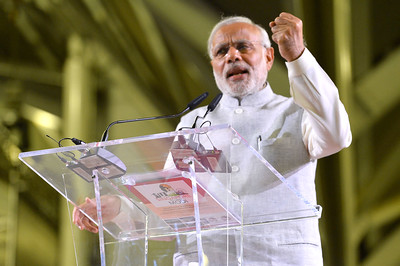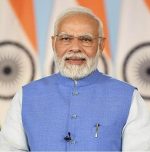A small change in grammar, a giant leap for the nation

http://www.sify.com/finance/change-in-grammar-news-default-oiqdNtiejdicf.html: An article by: Malavika Sangghvi
So how did Narendra Modi’s maiden Independence Day speech at the Red Fort go down? Did he tick all the boxes predicted by commentators and his spin doctors? Did he seize the opportunity to introduce big bang ideas to the nation? Did he impress and convince? Inspire and include? Was his message coherent? And above all, was he credible?
The thing that occurred to me while watching the prime minister’s animated body language and his impassioned delivery was this: he’s somehow managed to turn the noun ‘PM’ into a verb. ‘
Watching him speak extempore, his face alive and reflecting his changing moods, and hearing his fervent appeal to the nation to put its confidence in him, I could not help but compare him not only to his predecessor – who was abysmally poor at public delivery – but to all other prime ministers in recent memory.
Did any of them, even the best of them, ever come across as so eager to be accepted and trusted? Did any of them ever allude to himself as an outsider – a newcomer to the power citadels of Delhi? Did any of them ever give the impression that he was there to roll up his sleeves, get down to work and actually serve the nation, the way Modi did yesterday? I think not.
Of course we’ve had prime ministers who have been better orators (Atal Bihari Vajpayee), introduced bigger ideas (P V Narasimha Rao) or just been more photogenic and charismatic (Rajiv Gandhi). But even the best amongst them has not communicated that one absolutely essential, and hitherto neglected, idea to the people of India: that he is there to serve, to work, to perform and to report to the people who voted him to power.
This is what I mean when I say that Modi successfully changed the very grammar around the notion of prime minister.
In contrast to the high-minded and lofty, but ultimately empty, sentiments expressed by earlier prime ministers speaking from the same platform, there was an urgency in Modi’s words, a sense of accountability, a feeling of transparency, a realisation that this man was here to do a job for us, to deliver on his mandate, to work overtime, to burn the midnight oil and to fulfil our hopes.
I watched an array of TV programmes post NaMo’s speech in which the country’s top political analysts dissected it from the prisms of their learning.
Some spoke about his heartfelt expression towards women empowerment and security, others about his surprisingly bipartisan nod towards his predecessors, some about his call for a 10-year moratorium against communal, caste and sectarian violence and some others about his proposal to dismantle the Planning Commission, so on and so forth.
In fact there were many big ideas that came up in NaMo’s maiden I-Day address: his appeal for peace with India’s neighbours, his concept of India becoming a manufacturing hub; of its being known as a digital nation; a country which respected its federal structure; where progress and development were achieved through partnership between the citizen and state, government and industry.
” He put the ‘I’ back in India,” said one commentator. “For the first time, a prime minister spoke about national character building,” said another.
To me, I guess, coming from the universe of words, what was most exciting was that before my eyes I saw the meaning of a word change.
From noun to verb, a PM wasn’t just some one, but someone who did something.
A small change in grammar, a giant leap for the nation.
Image credit: PM Narendra Modi in Singapore image by Narendra Modi is licensed under CC BY-SA 2.0
Image Reference: https://www.flickr.com/photos/narendramodiofficial/23795890516









Leave a Reply